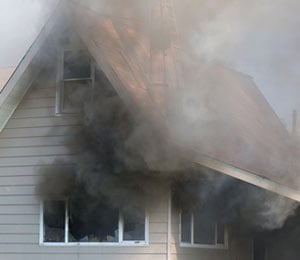When the kids go back to school and the leaves start changing colors,  we start seeing news reports about fire safety. We see firefighters visiting homes and replacing batteries in smoke detectors or installing new ones. We hear radio commercials about getting your furnace inspected. Yes, the change in season brings about all kinds of things that we must consider to make our homes safe for the arrival of winter.
we start seeing news reports about fire safety. We see firefighters visiting homes and replacing batteries in smoke detectors or installing new ones. We hear radio commercials about getting your furnace inspected. Yes, the change in season brings about all kinds of things that we must consider to make our homes safe for the arrival of winter.
Earlier this year, we adopted a kitten from the Humane Society. We never owned a pet before so this a new experience for our family. While we enjoy having him in our lives, we realized it’s like having a small child in the house! We had to make small modifications to our house to make sure he stays safe. He gets into everything!
According to the National Fire Protection Association, pets and wild animals start approximately 700 home fires per year. Therefore, if pets are part of your family, here are some tips to help prevent fires and to get them out safely.
1. Protect your electrical cords. Like many puppies and kittens, our kitten loves running behind the entertainment center and chewing on the cords. As a result, I moved all my cords off the floor and onto the entertainment center. I figured that would show him. It didn’t. Now he just squirms his way between the shelves through the cords. Finding my Xbox 1 unplugged was the last straw.
Many pet stores sell bitter apple spray. This spray has a non-toxic taste kittens don’t like. My cords have been sprayed! If you’ve tried the spray and found it doesn’t work, you can get cord protectors that slide over cords or flexible tubing to run all your cords through.
2. Avoid candles. At this time of year, my wife loves burning the fall-scented candles. Unfortunately, this year, we’re going to have to pass on them. There’s no place he can’t get to once he puts his Superman cape on. Candles in pumpkins can also be dangerous. Flameless candles and scented items are safer.
3. Unplug holiday lights. I’ve heard kittens love to get into Christmas decorations. If you have a new pet, you may want to unplug your Christmas decorations when your family isn’t around to supervise.
4. Limit the area in which they can wander. If your pet is well-trained, you may let it have the run of the house when you’re gone. While this freedom is nice for your pet, it can be dangerous when you’re not home. You may wish to keep your pet near entrances or limit the area it can roam. If there’s a fire, it will be more easily accessible to firefighters who are entering your home.
5. Consider a monitoring service. Since my kids were small, we’ve had ADT. The system alerts us when doors open and close, keeps our home safe from burglaries, and monitors our home for fire. If you have a pet, you may wish to sign up for a monitoring system. If there’s trouble at your house, you – and local fire and police departments – will be notified quickly.
6. Make leashes and kennels accessible. Make sure you have easy access to leashes or kennels in the event of an emergency.
7. Make sure your pets are identifiable. With all the commotion during an emergency, it’s possible your pet could get out without you knowing. Make sure your pet wears pet tags or is microchipped. If someone finds your pet and delivers it to the local shelter, they’ll know who to call.
8. Practice evacuation with your entire family. If you have a new pet, now is the time to discuss updated evacuation plans with your family. Be aware of where your pet hides when it’s scared. This may save time trying to find it in an emergency. Remember, it’s important to get your family out safely. Never go back into a burning house to look for your pet.
For more tips on fire safety, check out the blogs below.
10 tips to help prevent candle fires in your home
Prevent house fires. Tips for storing and disposing of oily stain rags
A clean chimney can save your home and your family.
Hiring a reputable chimney sweep can save time and money, not to mention your home!
Fire pit safety tips
Four benefits of a furnace inspection
How to protect your family from a dryer fire
A faulty dehumidifier could burn your house down
To protect your pet from natural disasters, check out the link below.
Make a Disaster Plan for Your Pets
Do you have any tips or information you’d like to share? I’d love to hear them; please share them in the box below.
Sources:
http://www.nfpa.org/public-education/resources/safety-tip-sheets
http://www.petmd.com/blogs/thedailyvet/ken-tudor/2014/july/how-prevent-your-pet-starting-fire-31866